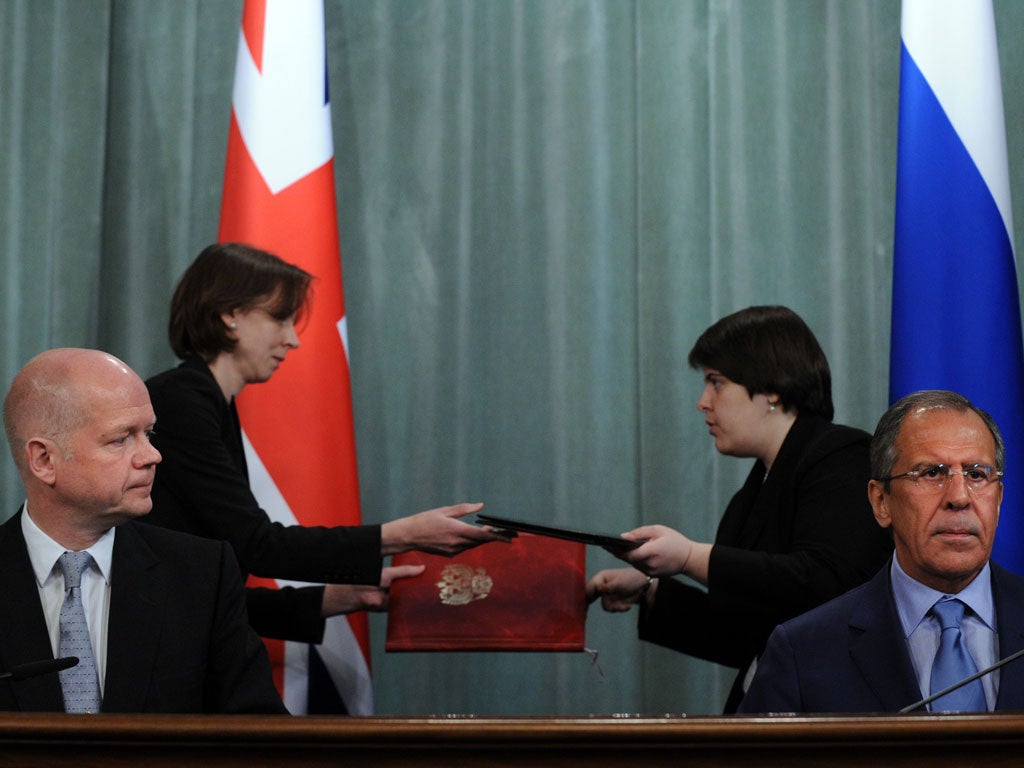Hague sent packing by Russia as Annan peace plan crumbles
Moscow backing of Assad leaves hopes for united front in tatters

Kofi Annan arrived in Damascus yesterday in a desperate bid to rescue his peace plan and prevent Syria from sinking deeper into civil war, but hopes of a united international front were dashed when Russia refused to unequivocally condemn Bashar al-Assad's regime for the Houla massacre.
Mr Annan held talks with the Syrian President while the British Foreign Secretary, William Hague, sat through a tense press conference in Moscow in which his Russian counterpart, Sergei Lavrov, insisted that all sides shared the blame for the massacres of the past few days.
Russia's backing of a UN Security Council statement condemning the deaths on Friday of more than 100 civilians in Houla had raised hopes that Moscow may finally relax its opposition to putting real pressure on Mr Assad's regime, which Russia views as a key ally in a volatile region. Mr Lavrov conceded that government forces bore the main responsibility for the massacre, but insisted that the presence of knife and bullet wounds on some corpses meant the opposition was also involved. Mr Lavrov also suggested that recent bombings in Syria bore "all the hallmarks of al-Qa'ida".
He said: "We are dealing with a situation in which both sides evidently had a hand in the deaths of innocent people."
Mr Lavrov also repeatedly accused other nations of egging the rebels on and pushing them to break the ceasefire and provoke a response from Mr Assad's forces, in the hope of forcing international intervention.
"All the parties involved need to be playing the same tune," Mr Lavrov said.
"We should be attempting to implement the peace plan and not trying to change the regime. It's time to choose between pursuing geopolitical goals and saving lives."
As Mr Annan arrived in Syria – a country still coming to terms with the deaths of 108 people that include dozens of women and children in Houla – there were reports of escalating fighting in the central city of Hama, where the opposition says Syrian army artillery barrages have killed 41 people.
"I am personally shocked and horrified by the tragic incident in Houla two days ago, which took so many innocent lives, children, women and men," Mr Annan said before entering talks with Mr Assad and other senior officials.
The UN's peace envoy said that all sides of the conflict had to end the bloodshed, insisting that "this message of peace is not only for the government, but for everyone with a gun".
The Syrian government continues to blame the Houla massacre on "terrorists" and Sunni fundamentalists, but has not spelt out in convincing detail how it believes the mass killings occurred.
Anti-government opposition sources in Damascus said they have been told by surviving villagers at Houla that, after fighting between the Free Syrian Army and regular government forces last Friday, Alawite militiamen entered the village and began the massacre. They said the militiamen were acting in retaliation for the killing of a government informant in their village a month ago, but this could not be independently confirmed.
The mood in Damascus is becoming increasingly tense as people absorb the shock of the atrocity at Houla. There is the sound of sporadic shooting in some parts of the capital and the explosion of a bomb near a school in one suburb sent parents racing to pick up their children. Government control is tight in the centre of the city and there are many more checkpoints late at night.
Mr Annan's original plan envisioned a ceasefire beginning on 12 April, but it is now being broken on a daily basis, according to the UN monitoring team. Few Syrians expect Mr Assad or the leadership of the regime he represents to consider giving up or even sharing power unless they face the prospect of losing their last allies. They also look for support to Iran, allied with Syria for 30 years, and, to a lesser extent, Iraq.
Mr Annan faces a difficult task to get either the Syrian government or the rebels to implement his six-point peace plan signed seven week ago. A national dialogue now looks unlikely because of the hatred and distrust between the two sides. And the government does not feel strong enough to allow the release of detainees or a withdrawal of heavy weapons from cities as it promised.
Join our commenting forum
Join thought-provoking conversations, follow other Independent readers and see their replies
Comments
Bookmark popover
Removed from bookmarks